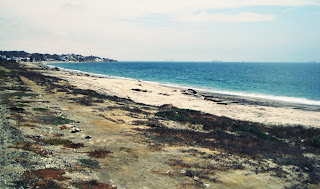Saturday night at Montanita was very noisy. I wore my ear buds and from my computer played on continuous repeat a 57 minute minimalist work by Charlemagne Palestine. The repetitive and slowly developing piano did well to drown out the loud music and the drunken yelling in the streets. But later mosquitoes came in through the cracks in the board walls of the room and I was forced to construct my tent upon the bed and to sleep inside it as a kind of mosquito net. It had all the excitement of camping with the comfort of a mattress and I slept well after that, the piano repetitions putting me into a deep sleep.
It was cool and overcast when I awoke and I packed and was back on the road at 10am. E15 passed through little, dirty, poor pueblos along the ocean and I stopped at one and an old woman made me a desayuno of a fried egg atop a plateful of rice with two rolls. Then the road moved inland and there were rolling hills.
I stopped to take a break and a cyclist on a racing bike passed by and greeted me. It was the first cyclist I had seen in Ecuador. He was slow in ascending the hills and I was able to catch back up to him. I asked him if his gears were not working. No, he said, his gears worked, only he was very tired. His name was Victor and he lived in San Pablo, a town north of Santa Elena. He was returning from Montanita on his Sunday ride.
We rode side by side on the wide shoulder and talked. He was a civil engineer and spoke good English and insisted that we speak English so that he might practice.
“Do you see the new cars on the road?” he asked.
“There are many.”
“They are all bought with credit. Ecuador is all credit now. Dollars come into the country all the time.”
“I see property for sale everywhere.”
“Everyone is selling and buying and the banks are lending for houses and cars and things. The banks are full of money now. There are capital controls that keep the money inside the country. All the banks can do is lend it in Ecuador.”
“It is a dangerous way to go,” I said. “Debt growth without productivity is a dangerous combination. Capital controls only make this credit growth more severe.”
“Yes. And the Ecuadorian can be convinced to buy anything. The new car is an important status symbol to the Ecuadorian. Also the clothing with the fashion designer name on it.”
“And this is bought with credit?”
“The Ecuadorian does not understand credit. The Ecuadorian does not understand the prices of things. He will pay anything for anything if he sees other have it. He will pay anything because he wants it. The Ecuadorian is uneducated in this. You can make a great business in Ecuador selling things you buy off Amazon.com to these people.”
It was true. I had seen great variability in pricing sometimes even in stores on the same block. It hadn’t made any sense to me.
“You are the first Ecuadorian cyclist I have seen.”
“We are not a cycling people. And also it is socially not acceptable for my class.”
“You are from the upper class?”
“Yes. An Ecuadorian must not do anything alone. Those I work with must not know that I cycle alone. But even cycling is a not acceptable activity for my class. In the upper class I must dress a certain way and talk a certain way. In Europe I learned cycling. Europe changed me for many things but I cannot live in this way in Ecuador. This not acceptable.”
“You must play the game.”
“Yes, to play the game. I do not like to play the game. But it is a great time in Ecuador for me. There are great opportunities for me because the dollars come into the country and are captured here.”
“Then you like Correa?”
“Very much I like Correa. I am doing real estate and he makes a great bubble. It is a great time for me here now. What do you do?”
I gave Victor a short history of my last decade and he was particularly keen on the trading part. He had himself done some trading though unsuccessfully and he understood both bonds and futures contracts. Before real estate, he explained, he had been a trader in bananas for two years. Before that he had gone to Germany to earn an MBA and then worked in Holland and even for a short time in New York. Victor was the most impressive Ecuadorian I had met. I wondered why there were not others like him, others willing to go and to do whatever it took, legally or illegally, to improve themselves.
“But why do poor Ecuadorians not turn to cocaine and marijuana production? They have a climate and land similar to Colombia. Many poor and uneducated Colombians have improved their lives from the drug trade. Colombia‘s economy has also grown very much because of it.”
“Ecuadorians do not like risk. Ecuadorians do not do anything that scares them.”
“Ecuadorians lack the criminal nerve.”
“Ecuadorians are lazy. Ecuadorians do not like to work. Ecuadorians are without education.
I remembered how nearly every Colombian I met, even the poor, were studying something. Ecuador neighbored Colombia, but the national character was entirely different.
“Are you married?” Victor asked.
“No.”
“If you want an Ecuadorian wife you must go to the universities. You will be unable to live with an Ecuadorian woman without education.” Victor pointed towards a pretty teenager walking in the dust along the road. “You will die of boredom by her.”
Victor was married and expecting his first child with an educated Ecuadorian woman who was also part German. He was able to speak German with her and she also had blond hair which pleased him greatly. At San Pablo we shook hands and said goodbye and wished each other much luck and Victor turned off and I continued on towards Santa Elena. The road turned inland from the ocean and the country was dry and yellow brown and the sun was now very hot. After some sweaty climbing over the hills I entered the dusty, beat up town of Santa Elena. I found a room near the center plaza for $7, showered, bought some fruit, bread and water at a nearby tienda, and went to bed.







0 comments:
Post a Comment